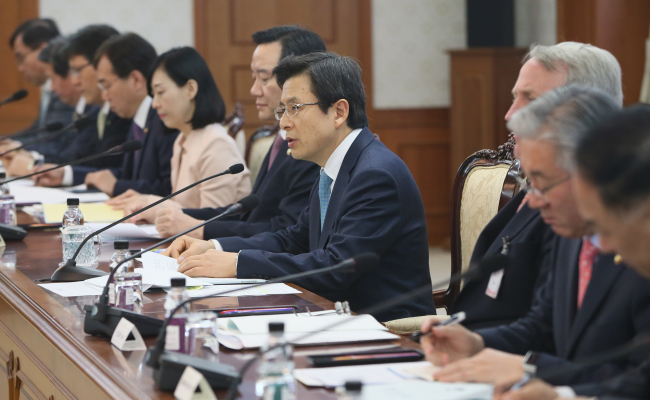The South Korean government on Monday announced plans to reduce the rate of illegally residing migrants to below 10 percent by 2018 by tightening prescreening.
In a meeting on policies for foreign nationals chaired by Prime Minister Hwang Kyo-ahn, the government vowed to crack down on foreigners staying in Korea without legitimate visas and to take measures to help immigrants integrate into society more smoothly.
As part of the efforts, the government will screen foreign nationals before airlines issue boarding passes, and step up border controls for passengers transferring at airports or entering Korea on visa waiverschemes.
“As international terror threats have intensified following the attack in Brussels, we plan to set public safety as our top priority by tightening border controls and managing illegal migrants,” Hwang said in the meeting at Seoul Government Complex.
“The increase in the number of immigrants can be positive in that it can sharpen the nation’s competitive edge and add diversity,” he said. “But it also heightens worries over illegal migrants and crimes committed by foreigners.”
 |
Prime Minister Hwang Kyo-ahn (center) speaks during the government meeting on policies for foreigners in Seoul on Monday. (Yonhap) |
Korea has been on alert after two Chinese nationals and a Vietnamese transfer passenger sneaked into the country without being noticed by immigration officials or airport security guards.
Currently, there are 1.9 million foreign nationals in Korea, accounting for 3.7 percent of the entire population. The Justice Ministry claimed that 11.3 percent of the total foreign population was here illegally.
The government will also revise the Employment Permit System to prevent migrant workers from illegally staying in the country after their contracts expire. Under the EPS, Korea selectively receives migrant workers from countries in Southeast Asia and Central Asia who work in labor-intensive firms.
The revised EPS will give more authority to Labor Ministry officials to report migrants who breach visa conditions. It will also ramp up screening of foreign applicants before issuing visas and accept temporary workers who can work in the country for up to 90 days in the agricultural sector. The rate of illegal residence in Korea by country of citizenship will be taken into account when the government sets country quotas for incoming workers under the EPS.
The government also plans to help immigrants better integrate into society by expanding services aimed at foreign nationals and raise awareness of cultural diversity, it said. It will offer free legal counselling in various languages for migrant workers and increase the number of multicultural schools.
For the overall plan to manage the foreign population, the government assigned 67.76 billion won -- a 3.1 percent decrease from before -- for 1,227 projects.
By Ock Hyun-ju (
laeticia.ock@heraldcorp.com)







![[Today’s K-pop] Blackpink’s Jennie, Lisa invited to Coachella as solo acts](http://res.heraldm.com/phpwas/restmb_idxmake.php?idx=644&simg=/content/image/2024/11/21/20241121050099_0.jpg)
